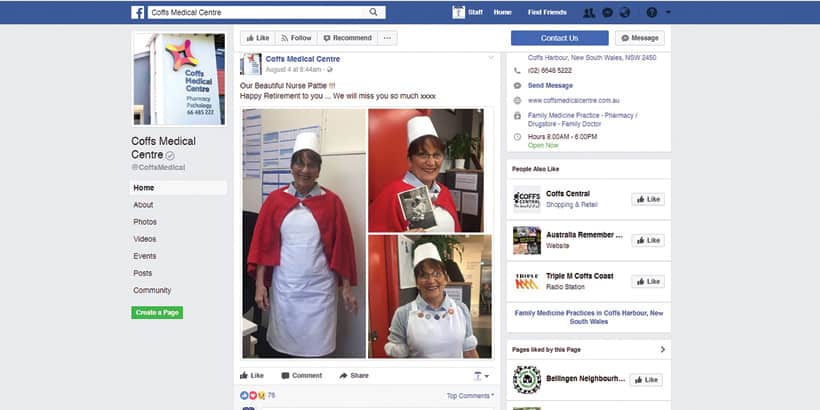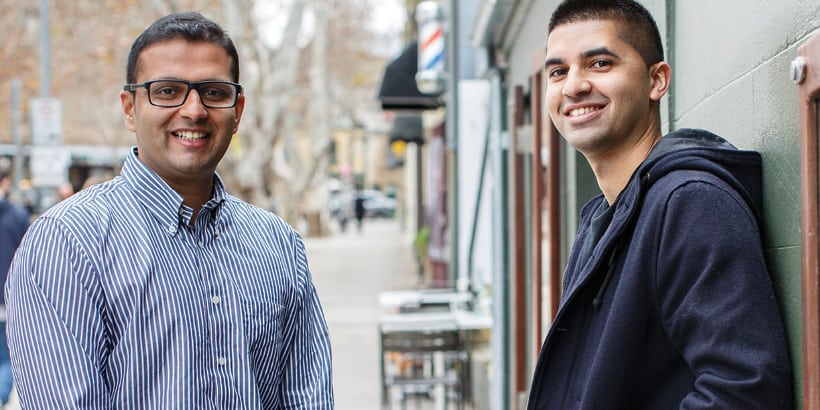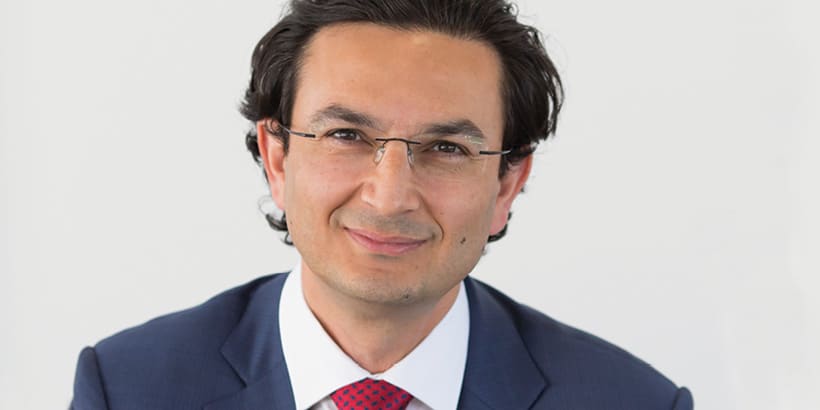
The power of your online presence
September 12, 2017
Changing the face of cancer care
September 12, 2017PROFILE
After enduring years of harassment from a former patient that included verbal threats and cyber bullying, A/Prof Munjed Al Muderis was awarded $480,000 in a landmark defamation case. But is it really over?
“I believe strongly that the vast majority of people are good. There’s goodness in everybody and there are a very small minority of bad people. Unfortunately, I was unlucky to deal with one person that is genuinely a bad person.”
Associate Professor Munjed Al Muderis performed hip arthroscopy on Gerardo Mazzella in March 2010.
What happened next was a campaign of harassment that was so vitriolic in nature that A/Prof Al Muderis considered leaving the country, not only for the sake of his reputation, but for the safety of his family.
Mr Mazzella suffered from chronic pain for 17 years when he came to A/Prof Al Muderis, who suggested the pain was the result of a hip condition that could be improved with surgery. The operation went as planned and lasted two hours and 40 minutes. A/Prof Al Muderis warned his patient not to fly after the surgery, but ignoring this advice, Mr Mazzella went ahead with his trip to Thailand. When he returned for his follow-up appointments, Mr Mazzella complained there was a loss of sensation in his penis and scrotal area.
In his online video titled ‘DR AL MUDERIS THE BUTCHER’, Mr Mazzella claims A/Prof Al Muderis crushed his pudendal nerve. “What he had actually done was crushed my pudendal nerve. It’s a bi-lateral nerve that comes out on two sides and he crushed both branches, which means my penis is numb.”
As a result of these complaints, A/Prof Al Muderis sent Mr Mazzella for tests with a urologist and a neurologist, each of whom tested the nerve signals in the pudendal nerve. Neither found any evidence of damage.
With each follow up appointment, Mr Mazzella became increasingly hostile and aggressive. His brother Rodney Duncan attended the last appointment with him in September 2010, and said to A/Prof Al Muderis: “My brother lost his dick; I’m going to chop your dick off.”
A/Prof Al Muderis recalled, “Initially, he was constantly harassing me on the phone – trying to extort money from me. Then he started making threats, and eventually the threats became violent and started becoming very aggressive.”
After dismissal of the medical negligence suit and the complaint to the HCCC, the calls and texts from Mr Mazzella became more frequent and intimidating.
He intimated that he knew where A/Prof Al Muderis’ wife worked and where his children went to school, adding that “we can get to them”.
Mr Mazzella sent photos of himself holding a semi-automatic rifle. He tattooed the number A/Prof Al Muderis was given – 982 – at the Curtis Immigration Detention Centre on his neck. Mr Mazzella was obsessed.
“At some stage I was considering leaving the country and operating abroad,” A/Prof Al Muderis said, adding that the situation has even affected his decision about buying a house. “I am living in a flat that is secure because I fear for the safety of my family.
“Sadly, these kinds of actions and these kind of people become so psychologically disturbed they don’t let go. And quite often it can escalate to serious consequences.”
A/Prof Al Muderis reported Mr Mazzella to the police and an AVO order was taken out against him. He received a suspended sentence in prison for four months, but that didn’t deter him. He stopped contacting A/Prof Al Muderis in person, and took his harassment online.
Mr Mazzella and his brother Mr Duncan created a website with the surgeon’s name in the web address and posted videos in which they referred to A/Prof Al Muderis as a “butcher” and, according to the Supreme Court NSW documents, suggested he was unethical, arrogant, and had a reckless disregard for human life.
The brothers purchased Google ads to ensure the website displayed prominently in any searches for A/Prof Al Muderis. They used several different social media sites to post defamatory comments, such as Facebook, You Tube, Vimeo, Video Bash, Internet Archive, Ru Tube, Daily Motion and Pinterest.
Eventually word of these virtual attacks reached A/Prof Al Muderis.
“I heard about them from colleagues, staff and patients – I don’t search myself online, but eventually I started doing that. I had to be aware of what’s going on, because he used to come out with different stories every day. And the whole incident was his canvas – and he was very colourful and creative coming up with multiple stories and videos. Because he had all the time on earth and unfortunately he knows that, as doctors, the biggest thing that we have is our reputation and that can be damaged very easily.”
The NSW Supreme Court ordered the first website to be taken down in 2016, but like weeds, the brothers simply created more: www.almuderis.org.au; www.almuderis.me; www.dralmuderis.com. Two of these were removed, but one website remained.
In his defamation suit, reputation witnesses recalled the effect these online attacks had on A/Prof Al Muderis.
Orthopaedic surgeon Dr Solon Rosenblatt stated that when patients mentioned the websites to A/Prof Al Muderis during appointments, he saw his “shoulders drop, his head and face drop and a look of despair and/or desperation come over him.”
His co-workers were well aware of the virtual smear campaign and more than once A/Prof Al Muderis overheard comments in the lunchroom at Macquarie University Hospital about the websites. A/Prof Al Muderis said support from colleagues and the hospitals he worked for varied.
“To be honest, my close friends were very supportive. In the medical community there is also the good and the bad. They are humans as well, some were supportive, and some were not.”
When Mr Mazzella plastered Norwest Private Hospital with leaflets and banners denouncing A/Prof Al Muderis, the hospital administration directed staff to collect and bin the defamatory materials. They also used their security staff to protect A/Prof Al Muderis.
Unfortunately, the doctor says he didn’t receive the same level of support from another hospital he worked for, and Mr Mazzella was allowed to freely distribute his materials.
A/Prof Al Muderis filed his civil suit against Mr Mazzella in September 2016. It became clear in the defamation proceedings that A/Prof Al Muderis is a well-respected surgeon, who has already undertaken an exceptional journey to become a doctor in Australia. In 1999, he was forced to flee Iraq after refusing to surgically remove the ears of soldiers who had escaped the army. A/Prof Al Muderis narrowly escaped the hospital by being smuggled in a bus to Jordan, then flew to Malaysia and then Jakarta. From there, he made the perilous 36-hour journey by boat to Christmas Island with 165 other refugees.
He was then detained at Curtin Immigration Detention Centre for 10 months – a place he refers to as “hell on earth”. He was granted refugee status in 2000, and after a period of further medical training obtained a Fellowship of the Royal Australian College of Surgeons in 2008. He is also a Fellow of the Australian Orthopaedic Association, and has two post-specialisation fellowships: Lower Limb Arthroplasty, Hip and Knee Arthroplasty and Trauma.
Justice Stephen Rothman noted that A/Prof Al Muderis was “the perfect plaintiff”. He is an ambassador for Red Cross Australia, Amnesty International, the UN Refugee Agency and International Settlement Services, and is a patron of the NSW Amputee Association. He has twice been nominated for the Australian of the Year in 2015 and 2016 and was also nominated in the Humanitarian category of the Beirut International Awards.
The judgement states, “he is involved in charity, works for the Australian Defence Forces, gives of his time and money for persons who are less fortunate and has put Australia at the leading edge of medical technology.”
The Judge ordered Mr Duncan and Mr Mazzella to jointly pay $320,000 in damages, while Mr Mazzella must pay an additional $160,000.
Despite the successful defamation suit, A/Prof Al Muderis doesn’t believe the situation has completely been resolved with his former patient.
“No, definitely not. I’m pretty certain that he will resurface again at some stage and maybe this time he will come with a gun or a knife, but when the time comes, we’ll deal with it. I’m a very realistic person and I don’t believe in fantasies, but this kind of person is totally fixated and his life is circumnavigating around me at the moment and I don’t think he will change.”
Despite the emotional toll, as well as the personal expense in terms of time and money that this suit has taken, the surgeon says other doctors shouldn’t ignore cyber attacks on their character.
“The message is very clear. Don’t put your head in the sand. Don’t close your eyes and think that it never happened. You need to face it, you need to fight it. Unfortunately, it takes time, it takes money, but there is no price you can put on your reputation and your peace of mind. There are channels to fight back and avenues where justice can be had.
“We live in a country which has a constitution and we have the order of the law and if you follow the right steps eventually you’ll get the right outcome.”

